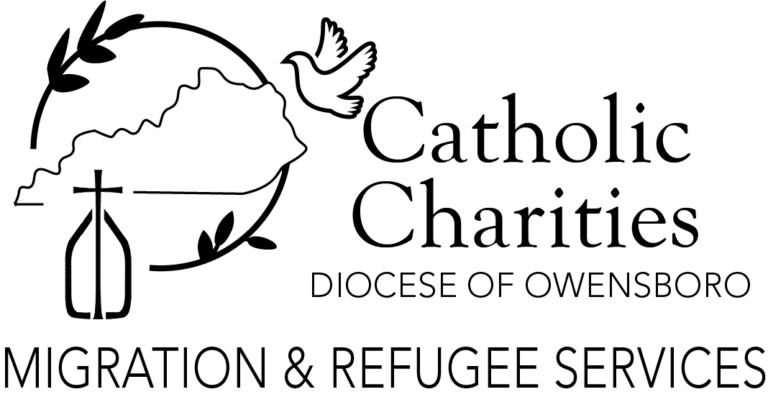Our Mission
At Refugee Resettlement Services, Catholic Charities, Diocese of Owensboro, we are dedicated to offering compassionate, holistic support to refugees, empowering them to rebuild their lives with dignity and hope. Guided by the principles of justice, inclusion, and compassion, we provide vital resources and opportunities to ensure successful integration into our communities. Through partnerships with community organizations and volunteers, we foster a welcoming environment that promotes self-sufficiency, cultural enrichment, and long-term stability—always reflecting Christ’s love and commitment to serving the most vulnerable.
Catholic Charities provides a variety of services and resources to individuals and families with qualifying statuses through federal- and state-funded programs.
Our refugee clients come to us through a partnership with the Department of State and the United States Conference of Catholic Bishops (USCCB). USCCB is the voluntary agency at the national level that facilitates resettlement efforts and assigns cases to our program. Through our programming we are able to serve refugees, asylees, and Trafficking Victim Visa (T-Visa) and Special Immigration Visa (SIV) holders. Additionally at Catholic Charities Diocese of Owensboro, we are the Legal Service Provider for Unaccompanied Minors who are housed at an approved ORR facility maintained by Methodist Children’s homes in Owensboro. We also represent any children released by ORR to a foster parent/sponsor in Kentucky.
Migration and Refugee Services provides:
- Housing Assistance: We help new arrivals secure safe, affordable housing for a stable start in our community.
- Public Assistance Enrollment: We connect clients with essential public support like SNAP, Medicaid, and other financial resources.
- Job Placement & Workforce Integration: We assist clients in finding employment, offering training for job readiness, resume building, and interview skills.
- Language Support: We provide connections to ESL classes and interpreter services to ease language barriers in areas like education and healthcare.
- Educational Support: We guide families in school enrollment and support adults in further education and training opportunities.
- Healthcare Access: We connect clients with medical services and mental health resources, helping them navigate the healthcare system.
- Cultural Orientation & Community Integration: We offer cultural orientation and organize community events to help clients adjust to American customs and community life.
- Legal & Immigration Services: We assist with immigration processes and referrals to guide clients on their path to residency and citizenship.
Who is a Refugee?
A person forced to flee their home due to war, persecution, or violence.
Recognized under the 1951 Refugee Convention.
The U.S. Refugee Admissions Program involves different governmental and non-governmental agencies that are both overseas and in the United States. Partners support the program through actions such as proposing admission ceilings, keeping us up-to-date on the worldwide refugee situation, screening cases, arranging travel, and administering benefits. All of the pieces together are called the U.S. Refugee Admissions Program.
The process of becoming a refugee involves several critical steps, governed by international law and managed by agencies such as the United Nations High Commissioner for Refugees (UNHCR) and national governments.
Average Waiting Time:
Refugees spend 10-17 years on average in camps or temporary shelters before being resettled
How Refugees Are Allocated to Local Resettlement Agencies
Allocation Process:
- U.S. State Department works with ten national resettlement agencies (e.g., USCCB, IRC).
- Factors influencing allocation:
- Family ties.
- Community resources and capacity.
- Local agency availability.
- Local Resettlement Agencies:
- Agencies like Catholic Charities handle resettlement in specific U.S. communities.
Before arriving in the United States, most refugees had a full life with work, family, and fun until circumstances forced them to leave their home. Otherwise, there is no typical refugee.
Some refugees come from rural areas, and some come from large cities. Some come from cultures relatively similar to ours and others may not trust or accept tools or services we take for granted. For example, a refugee may not be comfortable going to the doctor, as medicine practiced here may be drastically different from their home country. A refugee may be hesitant about using something as seemingly basic to us as a microwave or an ATM.
Many refugees had successful professional careers in medicine, law, business, or education in their home country. These individuals have not suddenly lost their intelligence, skills, or experiences because they lost their homes. But they do face cultural and language barriers as they work to rebuild their life in a new country.
With the assistance of Catholic Charities and community partners, refugees work towards becoming contributing members of their communities and the local economy. The majority of adults who are able to work are successful in finding employment within three to five months. Most gain financial independence within a few years and many become (or become again based on their previous occupation) business owners, carpenters, doctors, engineers, interpreters, landscapers, nurses, pharmacists, pastors, social workers, students in higher education, tailors, and teachers. Refugees have higher rates of entrepreneurship than the US-born population, and on average, within 25 years of arrival, the median household income for a refugee family is $14,000 more than the median income of US households overall.
We assist each refugee family with intensive case management services for 90 days, in addition to support until they are employed, for up to 12 months.
Catholic Charities of Owensboro serves a cross-section of refugees being resettled across the world. Currently we anticipate seeing refugees from Afghanistan, Venezuela, Nicaragua, Honduras, El Salvador and Guatemala.

